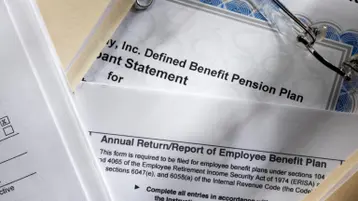The Role of Retirement Plans in Small Business Employee Satisfaction

Table of contents
- 1.What is a Retirement Plan?
- 2.Important Information About Retirement Savings Plans
- 3.Employer Tax Advantages
- 4.Different Types of Employer-Sponsored Retirement Plans to Consider
- 5.Employee-Sponsored Retirement Plans to Consider
- 6.How Retirement Plans for Small to Medium-Sized Businesses Enhance Employee Satisfaction
- 7.Stronger Employee Retention
- 8.More Effective Recruitment Strategies
- 9.Financial Security for Employees
- 10.Improved Productivity
According to the Department of Labor, Americans will need about 70 to 90 percent of their pre-retirement income to maintain their current standard of living when they stop working.1 However, only about 46% of households reported any savings.2 The reality is that over half of Americans have nothing saved, and many aren't sure how or where to start. Although some reasons behind this may be financial struggles, student debt and an increasing cost of living, others simply don't have access to a retirement plan. For instance, only one-third of small businesses offer retirement plans, as many business owners say they can't afford them.3 Yet, over 9 in 10 small business owners who offer a retirement plan said that one reason they did so was the positive effect on employee attitude and performance.4 But what does this mean for business? Is it worth the extra expenses for SMBs? Here, we'll provide insight into the role of retirement plans in small business satisfaction and how they can help your company.
What is a Retirement Plan?
Retirement planning is the process of setting financial goals and creating strategies to ensure a comfortable and secure lifestyle after an employee stops working. Retirement accounts and plans allow employees to contribute a part of their compensation to an account that saves for retirement income. Some plans are created strictly for saving, while others tie in investing to maximize their return. As with any savings account, the earlier employee contributions begin, the longer they have to accrue savings and benefit from investments.
Important Information About Retirement Savings Plans
Technically, federal law does not require private-sector employers to provide their employees with retirement plans. However, states are beginning to make their own laws. Depending on where your business operates, you may be legally required to offer some kind of retirement plan. This could be either a 401(k), a state-sponsored plan or another type of employer-sponsored retirement.
It's also important to remember that, as a small business owner, you're also responsible for your own retirement planning. You may be eligible for several types of contributions, depending on how aggressive you'd like to be with saving. For more important information about employee plans and plans for self-employed business owners, the Internal Revenue Service (IRS) website has plenty of resources.
Employer Tax Advantages
According to the IRS, "eligible employers may be able to claim a tax credit of up to $5,000, for three years, for the ordinary and necessary costs of starting a SEP, SIMPLE IRA, or qualified plan (Iike a 401(k) plan)." This helps reduce an employer's tax debt on a dollar-for-dollar basis. Although the tax credit is limited to three years, it's a great way to help offset the initial costs of retirement accounts and any employer-sponsored contributions. Additionally, contributions made by the employer to the retirement plan are often tax-deductible as business expenses.
Different Types of Employer-Sponsored Retirement Plans to Consider
There are several different types of retirement accounts and plans that employers can offer their teams. For each plan, employees can contribute a percentage of their income, a flat monthly rate or max out the limit for each plan. However, most plans have penalties for early withdrawals or loans, so it's important to consider long-term finances prior to taking advantage of limits. Some of the different types of plans that you can offer include:
- SIMPLE IRA (Savings Incentive Match Plan for Employees) - These are designed for small businesses with fewer than 100 employees. They allow both employers and employees to make contributions to the plan, with lower administrative costs and less complex regulations compared to traditional 401(k) plans.
- SEP IRA (Simplified Employee Pension) - These are similar to SIMPLE IRAs but are more geared toward self-employed individuals or business owners. Contributions are made solely by the employer and are tax-deductible, with flexible contribution limits.
- 401(k) Plans - These are employer-sponsored retirement savings accounts where employees can contribute a portion of their salary, often with employer-matching contributions. They offer tax-deferred growth on investments until withdrawal during retirement, providing a range of investment options and the potential for long-term wealth accumulation.
- Profit-sharing Plans (PSPs) - These are a bit more unique and entirely funded by employers. They distribute a portion of the company's profits to employees as contributions to their retirement accounts. This results in contributions based on company performance and typically vesting over a certain period of employment.
- Employee Stock Ownership (ESOPs) Plans - These provide employees with ownership interest in the company they work for. They're funded by allocating company stock, which helps employees align their financial interests with the company's success.
Employee-Sponsored Retirement Plans to Consider
There are also several retirement plans that employees may selectively choose to contribute to. Employers may also offer the following:
- Traditional IRAs - These are tax-advantaged retirement accounts where individuals can contribute pretax dollars. They allow for tax-deferred growth on investments until withdrawal during retirement.
- Roth IRAs - These are retirement accounts where individuals contribute after-tax income, offering tax-free growth on investments and tax-free withdrawals during retirement.
- Cash-value Life Insurance Plans - These plans combine life insurance coverage with a savings component, where a portion of the premium payments accumulates as cash value over time. They can be more complex but offer unique benefits.
How Retirement Plans for Small to Medium-Sized Businesses Enhance Employee Satisfaction
In today's competitive work environment, businesses with fewer than 100 employees have to work hard to attract and retain top talent. While many people might think the best way to do this is by raising an employee's compensation, benefits like health insurance and retirement can make a huge difference—especially regarding employee satisfaction.
Stronger Employee Retention
Retirement plans help promote financial stability among employees, reducing the likelihood of turnover driven by financial concerns. Employees actively saving for retirement are more likely to envision a lasting career with the company, cultivating a sense of commitment that translates into decreased turnover rates. Due to the high cost of turnover, retaining experienced staff through robust retirement benefits is often more cost-effective than continuously recruiting and training new hires. This makes retirement benefits a strong investment for SMBs regardless of their size.
More Effective Recruitment Strategies
A company gains a competitive edge in the job market by providing employees with a comprehensive retirement package. These benefits help attract top-tier talent seeking long-term security. Plus, your commitment to your employees' financial wellness futures fosters a sense of loyalty and satisfaction among the workforce, as they feel valued and supported by their employer. This can help enhance your business's reputation and position the company as a desirable workplace. This can help recruitment become easier, so you'll save money and stress on trying to headhunt for open positions or growth.
Financial Security for Employees
Every employee can start building their assets, regardless of when their contributions begin. Sponsoring retirement plans and encouraging eligible employees to participate helps them secure their financial security for the future. With 57% of employees stating that finances are the leading cause of stress in their lives,5 this security can do wonders for productivity, employee satisfaction and company loyalty.
Many plans also offer catch-up contributions, which allow employees 50 or older to make additional deposits into their accounts. This often exceeds the typical "limits" placed on employee contributions, which can help individuals "catch up" before retiring, further helping to secure their financial security.
Improved Productivity
Employees who feel confident about their financial future can focus more effectively on their work tasks without worrying about retirement planning. Moreover, retirement benefits often motivate employees to remain with the company long-term, leading to increased job satisfaction and commitment. This loyalty and dedication translate into higher levels of engagement and productivity as employees are more invested in the organization's success. Although each specific situation is different, productivity often translates to greater profits and improved scalability for SMBs.
Retirement benefits are important in creating an attractive benefits package for SMBs. Although they require some investment, especially if you offer employer contributions, the advantages can be worth the effort. To help make retirement planning easier and more affordable, work with TriNet today. TriNet offers a multiple-employer retirement plan, which can give your company a competitive advantage while boosting employee retirement savings. We also offer comprehensive human capital consulting solutions to help you handle your toughest HR needs. Book a demo with us today and gain access to HR experts who understand and can help provide guidance to help overcome industry-specific concerns while supporting a strong employee retention rate.
© 2024 TriNet Group, Inc. All rights reserved. This communication is for informational purposes only, is not legal, tax or accounting advice, and is not an offer to sell, buy or procure insurance. TriNet is the single-employer sponsor of all its benefit plans, which does not include voluntary benefits that are not ERISA-covered group health insurance plans and enrollment is voluntary. Official plan documents always control and TriNet reserves the right to amend the benefit plans or change the offerings and deadlines.
This article may contain hyperlinks to websites operated by parties other than TriNet. Such hyperlinks are provided for reference only. TriNet does not control such web sites and is not responsible for their content. Inclusion of such hyperlinks does not necessarily imply any endorsement of the material on such websites or association with their operators.

TriNet Team
Table of contents
- 1.What is a Retirement Plan?
- 2.Important Information About Retirement Savings Plans
- 3.Employer Tax Advantages
- 4.Different Types of Employer-Sponsored Retirement Plans to Consider
- 5.Employee-Sponsored Retirement Plans to Consider
- 6.How Retirement Plans for Small to Medium-Sized Businesses Enhance Employee Satisfaction
- 7.Stronger Employee Retention
- 8.More Effective Recruitment Strategies
- 9.Financial Security for Employees
- 10.Improved Productivity






